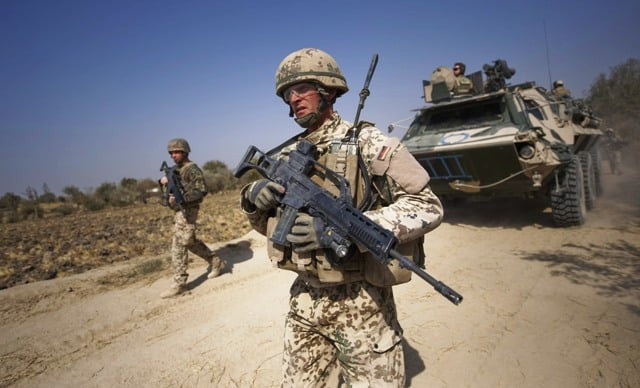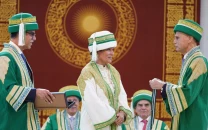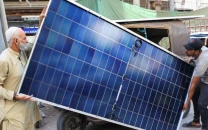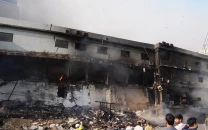Neighbourhood watch: US, Afghanistan yet to reach agreement on military presence beyond 2014
Opponents question US intentions; resistance guerrillas vow to continue war until complete withdrawal.

US is anxious to sign the agreement by October to plan their future presence in the country. PHOTO: AFP
Afghan President Hamid Karzai has been dragging his feet over the security pact that will allow continued US military presence in Afghanistan beyond 2014. Though some US and Afghan officials are hopeful that an agreement will be reached, the talks are yet to be revived.
President Karzai suspended talks in reaction to the Taliban opening their political office in Qatar this past June. Both sides have held a series of talks to finalise the bilateral security agreement (BSA), but the president became angry when the Taliban set up their office and fluttered their old ‘national flag’ and displayed a plaque of the Islamic Emirate of Afghanistan, the country’s former name under Taliban rule, outside their office.
Afghan authorities, who viewed the setting up of the office an informal recognition of a parallel government, believe the US had a hand in the scheme. They blame the American government for their ‘contradictory’ stance towards the peace process. Though the US has tried to woo Karzai and support his stance against the Taliban office, he remains unconvinced.
Senior US officials and Karzai recently hinted moving towards resuming the dialogue over the BSA and both sides are hopeful that some agreement will be reached well ahead of the Nato withdrawal. The BSA, however, has evoked mixed reaction in Afghanistan and the Karzai government is under pressure to share the demands and concerns of the public. Lack of transparency surrounding the pact could prove detrimental and hinder the peace process.
Some of Karzai’s political opponents, particularly the Northern Alliance, are pressuring him to sign the pact to avoid a potential civil war following the drawdown of foreign troops. Others view the BSA with much scepticism and are questioning US intentions.
“America wants to stay in Afghanistan because it does not have friendly relations with Iran and wants to suppress Iran until it proves its nuclear enrichment programme is for peaceful purposes,” said Dr Faruq Bashar, a former lecturer of political science at Kabul University. “Also, there are substantial gas, oil and other natural resources in the region.”
Cheragh, a private daily, said in an editorial that every article of the security pact violates the civil rights of Afghans. “Undoubtedly, the security pact between Afghanistan and the US is like a unilateral statement against the Afghan people and the government. The pact will give America a free hand to influence the economy, politics and military of Afghanistan,” the editorial read.
Despite the controversy, the US is anxious to sign the agreement by October to plan their future presence in the country.
Karzai and his presidential aides are being criticised by their opponents, who allege they may be seeking personal privileges in return for signing the BSA. They claim Karzai and his team want guarantees of immunity and continuing their political careers after the 2014 elections.
The Afghan president will also face a tough challenge if he decides to table the agreement in parliament, considering the parliament boycotted a previous strategic pact with the US when it was convened in November 2011.
As the deadlock persists, some American officials have warned the Afghan government of dire consequences if the pact is not signed. Former US ambassador to Afghanistan Zalmay Khalilzad spoke last month of the challenges being faced on reaching an agreement. He feared the possibility that both nations might not be able to reach a compromise.
Khalilzad said if the agreement is not signed it would be a great strategic failure and will result in US withdrawal from Afghanistan. Those Afghans who favour the pact argue the international community will continue its economic and military support to the Afghan government.
The Taliban and Hizb-e-Islami, the resistance group led by Gulbuddin Hekmatyar, have already stated that continued US presence implies the war will go on.
Published in The Express Tribune, August 3rd, 2013.






1733130350-0/Untitled-design-(76)1733130350-0-208x130.webp)






COMMENTS
Comments are moderated and generally will be posted if they are on-topic and not abusive.
For more information, please see our Comments FAQ